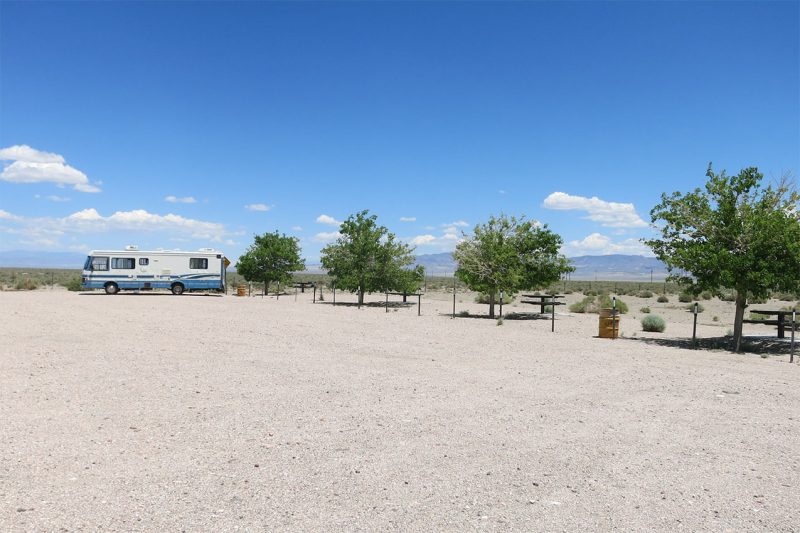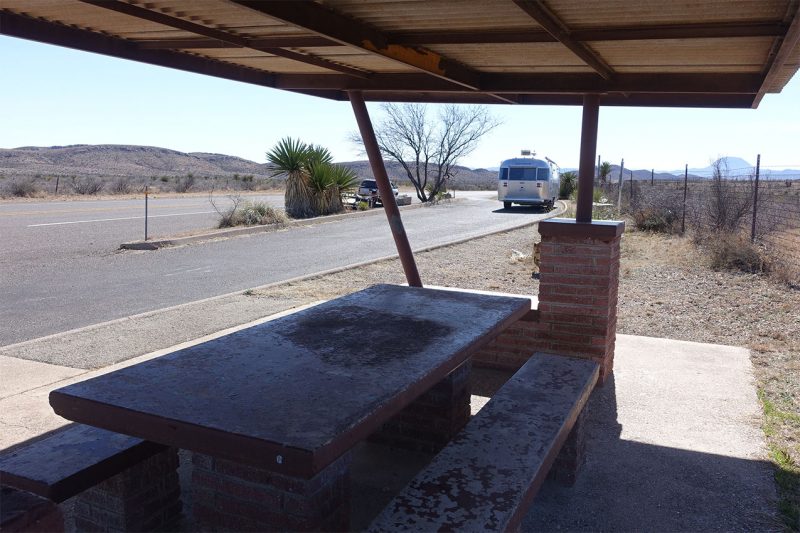Can You Sleep at Rest Stops in California
We've all been at that place—those long-haul days when you lot're putting as many miles under your camper tires equally possible to go from ane destination to the adjacent. When it comes time to get a piffling shut-eye earlier hitting the road again in the morning, y'all want somewhere to stay that is easy, fast, condom, and already on your route.
Enter rest stops. Rest stops are parking lots located along major routes or highways, designed to give travelers a place to go out of their vehicles, stretch, and use the bathroom. Some accept visitor centers, mowed lawns, public wifi, and heated facilities, while others take outhouses and a little patch of roadside brush for vegetation. No matter what they look similar, they all take one goal in mind—giving you a place to take a interruption.
Around the United States, some (but not all) states let overnight parking in their rest stops. Here is your ultimate guide to overnight parking at rest areas, including what overnight parking is, where to find it, and what you demand to know before you become.
What Overnight Parking Is and Isn't
Nearly remainder areas that let overnight parking specifically say "no camping ground." To those of us who travel in our RVs, this feels like a mixed bulletin. How can I park overnight but not camp?
While the definition of this isn't set up in stone, here's our take: overnight parking is pulling your RV into a rest stop parking lot, shutting downward your engine, taking your dog (on a ternion) for a quick potty break, and and then crawling into bed. In the morning time, you brew your coffee, toast a bagel, and hit the road.
Camping, in dissimilarity, is making yourself at abode—putting out your slides and jacks, unhooking your travel trailer, grilling a tasty dinner on the charcoal-broil, and setting up camp chairs outside to sentry the traffic go past. It's a leisure pursuit as opposed to the necessity of taking a pause from travel to sleep. With overnight parking, the goal to get back on the route as soon every bit you lot're rested.

How to Overnight Park
Wait…don't skip this section! I know, I know, you're probably thinking, "If I can't put out my slides and unhook my camper, how complicated could it possibly exist?" But there are a few best practices you lot'll want to follow for a peaceful, restful night's sleep in a rest surface area.
Showtime, practise your all-time non to park in spaces used by truckers. Commercial truckers have to follow a stringent ready of rules and regulations about how long they can drive and how long they need to rest. If they violate these rules, they face up steep fines and career-dissentious marks on their driving records.
Unlike campers, truckers are as well restricted in where they tin stay (when's the last time you saw a semi at an RV park?). If you pull into a crowded residuum finish and accept the concluding semi spot, at that place's a expert risk that you're going to hear about it, and not in an amicable style. Besides, who wants to army camp sandwiched between ii semis that run their engines all night? Exit trucker spots for the truckers.
2nd, trust your gut. In add-on to poring over reviews of rest stops here on Campendium, take stock of a residual expanse when you pull in. Is it well-lit? Are there whatsoever other RVs or trucks in the lot? Does it experience safety, or is your spidey sense going off? Your condom is in your hands when staying at a residuum stop, and often, the nearest boondocks is miles abroad. If anything near it makes y'all uncomfortable, move on.
Tertiary, get comfortable (within). You definitely don't want to make yourself at home in a residual stop, merely at the same time, it doesn't have to be your worst night's slumber. Park as far away from the road (and semis) as you can to reduce the nighttime racket, and place Reflectix in your windows to help block the light. A white noise machine or earplugs can help drown out even more noise, though you don't want to eliminate all sounds—if someone pulls off the highway and wants to snag the bikes off your bike rack, you'll want to hear it.
Lastly, nosotros have however to find a residual area that allows people to sleep outside of their vehicles. That means no tents and no hammocks.

States that Allow Overnight Parking in Rest Areas
As we mentioned above, not all states allow overnight parking at their rest areas, and most residuum areas are patrolled frequently enough that you'll likely get busted if you endeavour. And then, stick to the legal ones, which are:
Arizona: Arizona does not permit camping at their residue stops, merely they allow people to park and residue. If you use an Arizona rest stop overnight, be sure to keep your slides in, your trailer is hooked up, and all of your gear is inside.
Arkansas: If yous demand to slumber to proceed to drive safely, Arkansas allows you to do that within the confines of your vehicle in their remainder areas. No camping ground, though.
Idaho: In Idaho, you lot tin can park in an interstate highway rest expanse for 10 hours, and you tin park in a rest expanse on other land highways for up to 16 hours. The rules land that information technology is prohibited to camp or occupy a rest expanse "for whatsoever purpose other than rest and relaxation from the fatigue of travel."
Kansas: Overnight parking is immune in Kansas residuum areas for one night but. No camping.
Mississippi: Mississippi allows overnight parking for safety and rest but not for recreational camping ground. Vehicles can park for up to eight hours.
Missouri: Rest your caput for a night in a residuum stop in Missouri, where overnight parking is permitting at their residue areas.
Montana: Montana'south broad-open spaces can make concentrating on the road a challenge, then they welcome travelers to cease at one of their remainder areas for a snooze.
Nebraska: Catch a few winks at any of Nebraska's rests areas forth Interstate 80, which allow vehicles to be parked for upwardly to 10 hours. No camping allowed.
Nevada: Nevada allows vehicles to park for up to 18 hours in their rest areas, some of which even have dump stations for RVs.
New United mexican states: The Land of Enchantment wants you to stay rested and relaxed while on your journeying. They allow vehicles to park in rest stops for up to 24 hours in whatsoever three-day period.
North Dakota: North Dakota allows overnight parking at their rest areas, and many of them offer upwards water and free wifi, too.
Ohio: Ohio does not allow overnight camping at their residuum areas, with the exception of viii service plazas on the Ohio Turnpike. These 8 service plazas welcome RVs up to 40 feet long to overnight (and plug in) for a fee. The sites are all kickoff-come-beginning-served.
Oklahoma: Balance overnight in any Oklahoma rest area without whatsoever restrictions on the number of hours you can stay.
Oregon: Oregon allows travelers to residual up to 12 hours in their highway safety rest areas. No camping allowed.
Rhode Isle: While no camping is allowed in any Ocean Land rest expanse, overnight parking for safety and rest is permitted.
Texas: Texas knows that its highways are long, flat, and can become a little snoozy. They let overnight parking for up to 24 hours at all their rest stops; no camping allowed.
Utah: Utah says that "All remainder areas are posted for no overnight camping. However, extended stays are permitted and are monitored by the on-site staff and the Highway Patrol." And so, become that residual, so get moving.
Washington: You tin stay up to eight hours in a Washington residue area, many of which offer free java to help continue travelers caffeinated and warning. No camping is allowed.
Due west Virginia: Overnight parking is allowed for campers and semis at West Virginia'southward travel plazas, and about take a designated area for big vehicles.
Wyoming: Wyoming does not allow overnight parking or camping at their remainder areas but permits longer naps if you demand one. Just be sure to stay inside your vehicle and go on your slides in.
Source: https://go.campendium.com/overnighting-in-rest-areas/
0 Response to "Can You Sleep at Rest Stops in California"
Postar um comentário